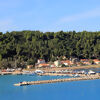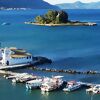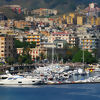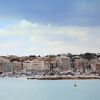7 Nights | GRECIAN DELIGHTS
You will visit the following 7 places:

Heraklion
Heraklion is the largest city and the administrative capital of the island of Crete. It is the fourth largest city in Greece. The Bronze Age palace of Knossos, also known as the Palace of Minos, is located nearby. Heraklion is close to the ruins of the palace of Knossos, which in Minoan times was the largest centre of population on Crete. Though there is no archaeological evidence of it, Knossos may well have had a port at the site of Heraklion as early as 2000 BC. Around the city can be found several sculptures, statues and busts commemorating significant events and figures of the city's and island's history, like El Greco, Vitsentzos Kornaros, Nikos Kazantzakis and Eleftherios Venizelos.

Katákolo
Katakolon, or Katakolo is a seaside town in the municipality of Pyrgos in western Elis, Greece. It is situated on a headland overlooking the Ionian Sea and separating the Gulf of Kyparissia from the rest of the Ionian. It is 11 km west of downtown Pyrgos. The small village of Agios Andreas, which in ancient times was the natural harbour for Ancient Olympia, lies northwest of Katakolo. A railway connects Katakolo with Pyrgos and Olympia, but along with the rest of the rail network in the Peloponnese, services have been suspended since 2011 for economic reasons.

Corfu
Corfu, an island off Greece’s northwest coast in the Ionian Sea, is defined by rugged mountains and a resort-studded shoreline. Nicknamed ''the island of the Phaeacians'', Corfu is home to the Ionian University. Known also as Kerkyra, is the northernmost of the Ionian Islands in Greece. Located off of the far northwest coast of the country, Corfu lies in the Adriatic sea, east of Italy and southwest of Albania. Historically Corfu has been controlled by many foreign powers, notably the Venetians, French, and British.

Messina, Italy
Messina is a harbor city in northeast Sicily, Italy. It is the capital of the Italian Metropolitan City of Messina, and has close ties with Reggio Calabria. The city's main resources are its seaports (commercial and military shipyards), cruise tourism, commerce, and agriculture (wine production and cultivating lemons, oranges, mandarin oranges, and olives). The city has been a Roman Catholic Archdiocese and Archimandrite seat since 1548 and is home to a locally important international fair. The city has the University of Messina, founded in 1548 by Ignatius of Loyola. Messina has a light rail system, Tranvia di Messina, that was opened on 3 April 2003. This line is 7.7 kilometres (4.8 mi) and links the city's central railway station with the city centre and harbour. The city is home to a significant Greek-speaking minority, rooted in its history and officially recognised.

Piraeus
Piraeus is a city in the periphery of Attica, Greece and within the Athens urban area, located 12 km southwest of its center and upon the Saronic Gulf. According to the 2001 census, Piraeus has a population of 175,697 people within its administrative limits, making it the third largest municipality in Greece and the second within the Greek capital following the municipality of Athens. The Piraeus urban area extends beyond the administrative city limits to the suburban municipalities, with a total population of 466,065.

Sorrento
Sorrento Neapolitan: Surriento is a town overlooking the Bay of Naples in Southern Italy. A popular tourist destination, it can be reached easily from Naples and Pompeii as it is at the south-eastern end of the Circumvesuviana rail line. The Sorrentine Peninsula has views of Naples, Vesuvius and the Isle of Capri. The Amalfi Drive, connecting Sorrento and Amalfi, is a narrow road that threads along the high cliffs above the Tyrrhenian Sea.

Civitavecchia
Civitavecchia is a town and comune of the Metropolitan City of Rome in the central Italian region of Lazio. A sea port on the Tyrrhenian Sea, the name ''Civitavecchia'' means "ancient town". The modern city was built over a pre-existing Etruscan settlement. The massive Forte Michelangelo was first commissioned from Donato Bramante by Pope Julius II, to defend the port of Rome. The upper part of the "maschio" tower, however, was designed by Michelangelo, whose name is generally applied to the fortress. North of the city at Ficoncella are the Terme Taurine baths frequented by Romans and still popular with the Civitavecchiesi. The modern name stems from the common fig plants among the various pools. And also next to the town is the location of the cruise ship docks. All major cruise lines start and end their cruises at this location, and others stop for shore excursion days that allow guests to see Rome and Vatican sights, which are ninety minutes away.









